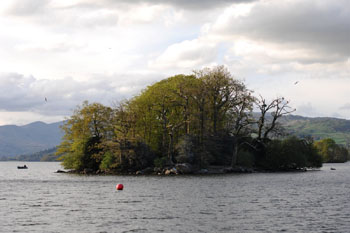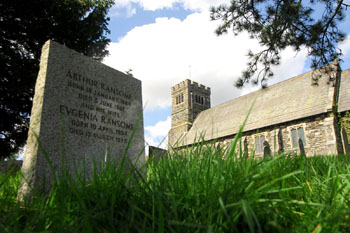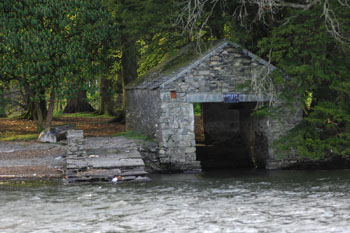The spy's story... childhood classic makes splash again
The Yorkshire Post, May 4, 2009
Martin Hickes
As a new film version of Swallows and Amazons prepares to set sail, Martin Hickes reflects on
Yorkshire author Arthur Ransome's 125th anniversary.
 THE English Lake District has inspired many of Britain's greatest writers, notably Wordsworth ,
Ruskin and Coleridge among others, but none perhaps are so affectionately loved as Arthur Ransome.
THE English Lake District has inspired many of Britain's greatest writers, notably Wordsworth ,
Ruskin and Coleridge among others, but none perhaps are so affectionately loved as Arthur Ransome.
Yorkshire-born Ransome, who would have been 125 this summer, drew on the breathtaking beauty
of the Lakes to act as the perfect backdrop for his classic Swallows and Amazons series.
Critics have since either lionised Ransome's works for being an epitome of a bucolic England
that once-was, or lambasted them for being an upper middle class daydream.
But, as film makers prepare to return to the days of John, Susan, Titty and Roger,
a whole new generation looks set to fall in love with Ransome and the Lakes.
Ransome was born in Leeds, and attended Yorkshire College (now Leeds University),
living for a while in Hyde Park.
Far more multi-faceted than his traditional image suggests, he was at times a journalist
for the then Manchester Guardian, a foreign correspondent, an author of more than 25 works,
including some specialising in Bolshevik Russia, an expert in Russian folklore as well
as being a passionate sailor and fisherman.
In 1922, he even had exclusive access to Lenin for a personal interview for the Guardian.
What was less known – and implausible to many – is that he lived a life as a British spy,
having married Trotsky's personal secretary. Recently uncovered evidence from National Archive
records revealed Ransome played a key role in monitoring the Soviet revolution for the British
Secret Service around 1919.
Conspiracies aside, producer Nick Barton of London's Harbour Pictures, who developed the hit films
Kinky Boots and Yorkshire-based Calendar Girls, is at the helm of a new production of Swallows and
Amazons, in association with BBC Films.
A Ransome devotee since his own childhood, he predicts the author has a special place in many people's
hearts, and hopes to fathom Ransome's own psyche in the production.
Commissioning Scottish screenwriter and BAFTA nominated Andrea Gibb, Nick hopes not just to capture
the charm of Ransome for the screen but also a golden age of childhood.
"I have been a huge fan of the books since I was a child, in fact became a sailor because of them,"
he says. "I have a boat at Blakeney on the North Norfolk coast – a Norfolk Oyster, a 17 foot boat,
a bit bigger than 'Swallow'.
"It is very much a passion project for me. I think that the stories resonate so much because they
evoke a simpler period, when children were allowed much more freedom than today; a time before TV,
the internet, computers, when children (including me) had to make their own amusements.
"The detail of tents, firemaking, sailing etc in the books, and the independence of youngsters
away from the adult world, are fascinating to a modern audience and have a lot to say to parents today.
"I grew up in the 1950s in England and South Africa and certainly we were given a lot more latitude
to roam. I guess in Ransome's days, in the 1930s and earlier, people were even more relaxed about
how children could cope on their own. Of course my chlldren and grandchildren, have much more
parental control.
"I think this is part of Ransome's appeal today; they evoke a lost, more innocent way of life.
His books are part of our English literary culture, and have been in print for so many years.
They really are true classics of children's fiction."
It is hoped the new version – which is still very much in the pre-production stage – will go
into production in 2010.
BBC Films and associated productions recently scored major hits with films such as The Duchess,
Revolutionary Road, and Becoming Jane, among many others.
 Visitors to Ransome's grave in Rusland, Cumbria can still today find the author, interred
with his Russian second wife Evgenia, in St Paul's Church.
Visitors to Ransome's grave in Rusland, Cumbria can still today find the author, interred
with his Russian second wife Evgenia, in St Paul's Church.
But even now, on this anniversary, can we seriously believe the man whose kindly uncle-type
works and whimsical words which captured the imaginings of millions was influenced by spies and subterfuge?
For a man who was known as S76 to the British Secret Service of the 1930s, could possibly
Swallows and Amazons have actually even been influenced by code words?
Far-fetched as it may sound, Ann Farr, an expert on the extensive Ransome archive at the
Brotherton Library at the University of Leeds, and also for the Arthur Ransome Society,
says the author was a fascinating enigma.
"Ransome's 'other' life as a spy is certainly intriguing and has been well documented –
and indeed is the subject of a new book due out this August," she says. "It's sure to
rekindle interest in Ransome himself and the role he played in Anglo-Russian relations
at that time. This will almost certainly reveal new evidence but will it be enough to lay
the mystery to rest? People will have to make up their own minds but I suspect opinions
will remain divided.
"What is known is that after the start of the First World War he became a reporter and
covered the war on the Eastern Front for a radical newspaper, the Daily News.
He also covered the Russian revolutions of 1917, developed some sympathy for the
Bolshevik cause and became personally close to a number of its leaders, including
Vladimir Lenin and Leon Trotsky.
"Ransome provided some information to British officials and the British Secret Intelligence
Service (MI6) considered him loyal, if not an agent; he was given the code name S76 in their files."
Five of Ransome's novels are set in the Lake District, two on the Norfolk Broads
and two more on the East Coast of England.
These latter novels feature his own favourite yacht, Nancy Blackett, named after one
of the series' main fictional characters. The remaining three novels are set in the
Caribbean, China and the Outer Hebrides.
Dissatisfied with the efforts of professional artists, Ransome eventually
illustrated all 12 books himself. For generations of readers, his artwork has
become an indispensible part of the books themselves.
Ransome's demand is still such that numerous societies across the globe, many
internet based, spur on international translations.
Dave Thewlis, a Californian-based Ransome enthusiast, and chairman and webmaster
to allthingsransome.net, says:
"The biggest reason for Ransome's appeal and durability is first and foremost
that he was a very good writer of anything, and particularly good at
children's books.
"By writing about things he knew and loved, he gave his books a sense of
reality, and he has a wonderful way of conveying the essential "real"
quality of his protagonists.
"And like the best children's books, they're written such that they are
enjoyed by adults as well, many of whom didn't encounter Ransome until their adult years.
"They are certainly not less accessible to children of today, or American children,
because they don't reflect today, or because they use British idioms and words
rather than American ones; I think their appeal is greater because they show a
different but enjoyable world, and the children in Ransome's books are real
people doing real things.
"Ransome is a superb and timeless writer who manages to make his locales, his
characters, and their activities absolutely real and appealing, and I think
for that reason his work transcends borders, cultures, and time. From an
international perspective certainly, Ransome, and the Swallows, the
Amazons, and the D's, will endure.
"The other interesting thing about people who like Ransome is the percentage
of them who embraced sailing, or camping, or geology, or astronomy, etc.
thanks to being introduced to him – and in fact, a number, who upon first
going sailing, discover they know how to rig and sail a small dinghy because
of him, with no further instruction required! I think that speaks wonders for
his ability to convey that information in the context of novels."
 Today, Ransome's Coniston and Windermere world has changed
immeasurably since the 1930s.
Today, Ransome's Coniston and Windermere world has changed
immeasurably since the 1930s.
Even parts of Lake Windermere now have "Wi-Fi" access, easily accessible from boats
and launches. But the islands he knew and loved are still lapped by memories of the
early 20th C.
Writing in the introduction to his 1930 masterpiece, Ransome mused: "Going away
from it (the lake], we were half drowned in tears. While away from it, as
children and as grown-ups, we dreamt about it. No matter where I was, wandering
about the world, I used at night, to look for the North Star and, in my mind's eye,
could see the beloved skyline of great hills beneath it."
As with many writers, it was the Romantic sublime of the Lake District which always
called him home.
The author, Martin Hickes, is a journalist and publicist in Yorkshire,
United Kingdom, and may be reached at martin.hickes@talktalk.net.
This article is ©2009 by Martin Hickes and the Yorkshire Post and is
reproduced here with permission. The photographic images are ©2009 by Martin Hickes
and are used with permission.
Back to the Literary Pages
Back to All Things Ransome
 THE English Lake District has inspired many of Britain's greatest writers, notably Wordsworth ,
Ruskin and Coleridge among others, but none perhaps are so affectionately loved as Arthur Ransome.
THE English Lake District has inspired many of Britain's greatest writers, notably Wordsworth ,
Ruskin and Coleridge among others, but none perhaps are so affectionately loved as Arthur Ransome.
 Visitors to Ransome's grave in Rusland, Cumbria can still today find the author, interred
with his Russian second wife Evgenia, in St Paul's Church.
Visitors to Ransome's grave in Rusland, Cumbria can still today find the author, interred
with his Russian second wife Evgenia, in St Paul's Church.
 Today, Ransome's Coniston and Windermere world has changed
immeasurably since the 1930s.
Today, Ransome's Coniston and Windermere world has changed
immeasurably since the 1930s.